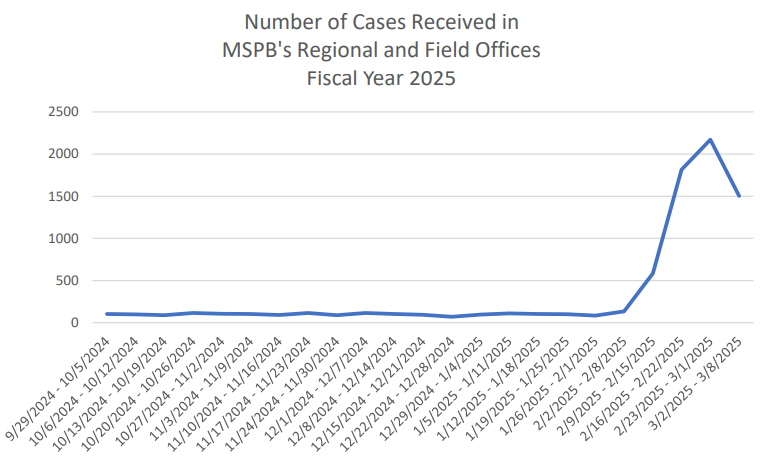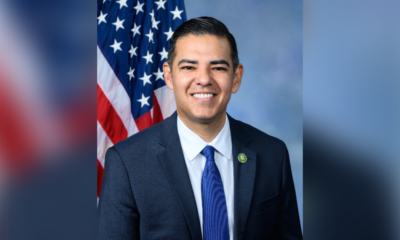Politics
Trump’s ‘direct assault’ on MSPB ‘alarming’ to former board member Limon

Federal employees are going to the Merit Systems Protection Board in droves to push back against the agencies who fired them as part of a governmentwide purge of civil servants within their probationary periods.
In the last three weeks, MSPB has seen a surge of nearly 5,500 new cases from employees following the Trump administration’s mass terminations.
MSPB is an independent, quasi-judicial agency federal employees can turn to in the face of adverse actions from their agencies. The board hears and issues decisions on cases from federal employees that allege prohibited personnel practices.
But the MSPB is now on thin ice as it once again faces a possible loss of quorum. Member Raymond Limon’s retirement from the board on Feb. 28, coupled with President Donald Trump’s target on current MSPB member Cathy Harris, put the board at risk of losing its ability to issue decisions on employees’ appeals.
“That [risk] was not lost upon me,” Limon said in a recent interview with Federal News Network. “But these institutions are under such direct assault, even if I decided to stay on as another year until my position got replaced, there’s no guarantee that this administration still would not have used all of its efforts, as it’s doing now, to eliminate the board’s effectiveness. Whether I stayed or didn’t, it would not negate the attacks being launched upon the Merit Systems Protection Board by this administration.”
Limon likened MSPB’s role amid the Trump administration’s actions to the story of David and Goliath. The roughly 60 administrative judges at MSPB are reviewing thousands of employees’ adverse action cases that stem from the rapid and broad upheavals of the federal workforce.
“Where I saw myself starting in government 30 years ago, and thinking about where I would end up, I really thought that we would have come a long way,” Limon said. “But it just shows how hard it is to create something — and how easy it is to tear it all down. And that’s where we are today.”
Just days before his retirement, Limon granted a 45-day stay for the Office of Special Counsel to continue investigating the terminations of six federal employees, all from different agencies. The employees were removed as part of the governmentwide firings of probationary employees.
Although agencies said the firings were based on “performance,” OSC argued the terminations were a guise for conducting back-door reductions in force (RIFs), while circumventing required RIF procedures. Limon’s Feb. 26 decision showed there was a credible argument that the six firings were unlawful.
“Even though the entire record is not public, I did have access to the information that OSC investigators were looking at,” Limon said. “I had an opportunity to do a deeper dive into that information, and then ultimately come up with the decision to order the stay. I feel very comfortable with where we landed on that.”
OSC has been taking on a number of cases from recently terminated federal employees and turning to the MSPB to request various stays. In early March, MSPB member Harris similarly ordered a 45-day stay on the terminations of nearly 6,000 USDA employees. The decision temporarily reinstated the employees in their jobs while the OSC continues to investigate the agency’s actions.
Though Limon is no longer part of the board, he said Harris’ stay decision closely tracked with his own decision just a week earlier.
The similarities of the cases indicate more decisions may go in favor of fired probationary workers. Most recently, at a hearing Thursday, a federal judge ordered the reinstatement of tens of thousands of probationary federal employees who were fired from their jobs at the departments of Veterans Affairs, Treasury, Agriculture, Defense, Energy and Interior. Senior District Judge William Alsup ruled that the Trump administration unlawfully directed the mass firings of probationary workers.
Earlier this week, another federal judge also appeared skeptical that the governmentwide firings were based on performance, and instead seemed to believe employees were “terminated as a group in order to achieve a broader objective.” The judge is expected to issue a written decision “promptly.”
At the same time, broader cuts to the federal workforce still loom. All executive branch agencies are expected to deliver their initial plans for reductions in force (RIFs) to the White House by the end of the day Thursday. Widespread RIFs are expected to occur over the next several months.
Trump’s attempts to remove OSC, MSPB leaders “alarming”
OSC’s ongoing investigations of the probationary terminations are now hitting much rockier terrain. Trump fired Special Counsel Hampton Dellinger, OSC’s top leader, in February. The removal led to Dellinger suing the administration, arguing that the termination was unlawful. Although Dellinger was temporarily reinstated due to a federal judge’s decision, circuit court judges then decided to once again remove Dellinger from his position while the case continued.
“This new ruling means that OSC will be run by someone totally beholden to the President for the months that would pass before I could get a final decision from the Supreme Court,” Dellinger said in a statement last week. “The harm to the agency and those who rely on it caused by a special counsel who is not independent could be immediate, grievous and — I fear — uncorrectable.”
Following the appeals court decision last week, Dellinger resigned from his position at OSC and withdrew from his legal battle against the Trump administration.
Though Limon spoke with Federal News Network prior to the news of Dellinger’s withdrawal from the case, Limon still said he was “concerned” about the future of OSC — particularly when considering Trump’s simultaneous attempts to remove MSPB’s Harris.
Trump fired Harris in February, but she quickly sued over her removal. Harris was reinstated after a federal judge ruled the termination was illegal and issued a permanent injunction. Harris plans to continue through the rest of her term, which is set to expire in March 2028.
But the next steps in Harris’ lawsuit are still unclear. The Trump administration quickly filed an appeal on the judge’s decision reinstating her as a board member.
Under statute, a president can only remove a leader from an independent agency, such as MSPB, in cases of “neglect of duty, malfeasance or inefficiency.” But Limon said it’s clear that so far, Trump is taking a different path, rather than trying to exercise the authorities afforded to the president.
“It’s an alarming trend on what this administration is doing,” Limon said.
Although Dellinger’s case is now withdrawn, Limon said he expects to see Harris’ case make it all the way to the Supreme Court.
“It’s always important to me, when I look at the statutes that define our missions, what is the legislative history? What is the purpose? And what is the spirit of that law?” Limon said. “If the Supreme Court justices focused on strict language and legislative history, I believe there will be no choice but for them to keep Cathy Harris in her job.”
But Alsup, the federal judge who ordered the broad reinstatements of probationary employees on Thursday, expressed reservations about the MSPB’s ability to bring feds back to their jobs — particularly considering Trump’s ongoing efforts to remove MSPB’s Harris, and Dellinger’s recent departure.
If Trump is successful in removing Harris from the board, the MSPB would no longer have quorum, and its ability to issue adverse action decisions would come to a halt.
“I have a feeling that’s where it’s headed now — is to decimate the MSPB, get rid of the special counsel, and these employees will have no recourse,” Alsup said during Thursday’s hearing. “That troubles me.”
“If there is no ability to appeal and get … a real, effective way to undo the harm to these individual employees, I don’t see how this could be channeled,” Alsup continued. “I did rely upon the government’s representations that the MSPB was an effective remedy. I thought it was.”
Incoming flood of cases from fired employees
In the last three weeks alone, MSPB received nearly 5,500 new cases from federal employees. Limon said that level of rapid surge is uncommon, but not necessarily unprecedented. The board has managed similar scenarios in recent memory.
“Back in 2013, during sequestration, there were a lot of reductions in force or temporary layoffs occurring, in which thousands of employees brought their cases before the board,” Limon said. “Since then, we’ve experienced a 35-day government shutdown and thousands of appeals came in then as well.”
In those times of surge at the MSPB, the board has specific strategies to try to manage the flood. That can include, for instance, joining together similar cases to try to speed up the process, Limon explained.
“The administrative judges have a little bit of a tiger team approach, with certain judges hearing certain kinds of cases, or certain judges focusing a little bit more on whistleblower cases,” Limon said. “That’s just a way to help streamline the significant number of cases, so they can manage that big influx.”
Graph depicting weekly number of cases received in MSPB regional and field offices, fiscal 2025. Source: Merit Systems Protection Board.
MSPB’s roughly 200 staff members — about 60 of whom are administrative judges — conduct hearings, examine evidence, issue decisions and publish studies on the federal workforce. MSPB’s three-member board, with two positions currently filled by Chairman Henry Kerner and Member Harris, hear cases where employees appeal a decision on an adverse action.
“It’s a way where an employee has a chance to defend themselves, and it’s up to the agency to show why they are taking those actions,” Limon said.
MSPB was created in 1978 as part of the Civil Service Reform Act — the most recent legislation to significantly reform the civil service. The legislation enshrined protections for federal employees against prohibited personnel practices, set merit-based rules for federal employment, expanded labor-management relations, and created protections for federal whistleblowers.
“Imagine, at that time, coming out of the Watergate scandals, there was a need to establish checks and balances against the executive branch and to ensure that employees have an opportunity to have a level of due process, as well as to bring whistleblower complaints,” Limon said. “They wanted to have agency leads in a position to do their jobs without the fear and chilling effect of political retaliation.”
The board certainly has experience in dealing with floods of RIF appeals. But in other ways, Limon said the recent surge at MSPB is exceptional.
“Rather than using those tools that historically agencies have used to right-size, downsize or realign, they went right towards the removal of probationary employees,” Limon said. “That may create some new case law for the board.”
Trump’s actions on MSPB a “direct assault”
When the Senate confirmed Limon to his position as MSPB’s vice chairman in 2022, Limon took on the first and only political appointment of his 30-year federal career. During that time, MSPB spent several years working through a historic backlog of nearly 4,000 appeals cases, which piled up as the board went without a quorum for about five years between 2017 and 2022.
In late February, with his term on the board about to expire, Limon considered various options, including a possible one-year extension of his position on the MSPB. But he ultimately opted to leave his position due to a combination of personal and professional reasons.
“Using my experiences of how the federal government works and opening that up more transparently to people who are interested in getting a deeper sense of how the government works, I felt I could do that better from the outside of government than the inside,” Limon said.
In a statement on Limon’s retirement, MSPB’s Harris described him as a “consummate civil servant with a heart of gold.”
“We were so lucky to have his expertise, compassion and good cheer at the board,” Harris wrote in a Feb. 28 press statement. “Ray was instrumental in the adjudication of virtually the entire backlog in less than three years.”
Prior his role at MSPB, Limon held multiple career leadership positions at the Office of Personnel Management. He also spent 16 years on the Chief Human Capital Officers (CHCO) Council, while serving consecutively as the first-ever CHCO at the Corporation for National and Community Service, deputy CHCO at the State Department and CHCO at the Department of the Interior.
“I did have an inside look at the level of caliber, professionalism and commitment to the federal HR statutes at OPM,” Limon said. “It was the premier HR shop in federal government, by and large — and I say ‘was,’ because it breaks my heart to see that there have been so many career people now, by my understanding, who have all been pushed to the side. This current administration obviously is not listening to them.”
“To say that this is not normal is underselling the argument,” Limon added.
Despite his concerns for MSPB’s future, and the looming possibility of another loss of quorum, Limon still said he was hopeful the board will continue operating moving forward.
“If the Supreme Court does the right thing in understanding the legislative history and the purpose of the Merit Systems Protection Board, then I have a high level of confidence that we won’t lose a quorum, and they’ll continue to do the good work,” Limon said.
Limon also emphasized that federal employees’ work governmentwide is critically important. He encouraged feds to continue to serve the public, despite the Trump administration’s efforts to overhaul the federal workforce. At the same time, Limon pointed to the importance of due process rights and job protections afforded to civil servants.
“It is not easy to get hired into the federal government. It’s almost a minor miracle. You are there because you are the best in class for selection,” Limon said. “But please take the time and remind yourselves of the role of the Merit Systems Protection Board, the Federal Labor Relations Authority, the Office of Special Counsel, the inspectors general that are out there, to listen to you if you are being mistreated.”
The post Trump’s ‘direct assault’ on MSPB ‘alarming’ to former board member Limon first appeared on Federal News Network.
Politics
Musk Has Gone Quiet About the Launch of His ‘America Party’ — Here’s What We Know


Maybe Elon Musk is more interested in planets than politics.
The mega-billionaire founder of Tesla, owner of X, and the genius behind the pioneering company SpaceX caused a huge stir in early July when he announced the birth of a new third party on the American political scene.
The question now is, whatever became of that?
Musk first broached the subject in a July 4 post on X when he launched a poll to find out what his followers thought. The results weren’t even close.
By a factor of 2 to 1, you want a new political party and you shall have it!
When it comes to bankrupting our country with waste & graft, we live in a one-party system, not a democracy.
Today, the America Party is formed to give you back your freedom. https://t.co/9K8AD04QQN
— Elon Musk (@elonmusk) July 5, 2025
“By a factor of 2 to 1, you want a new political party and you shall have it!” Musk wrote in a July 5 post.
“Today, the America Party is formed to give you back your freedom.”
Naturally, the post caused a splash.
Elon Musk is one of the few names in politics that can even come close to competing with the star power of President Donald Trump. So the idea that he could be mounting an actual challenge to Trump’s Republican Party would have been news indeed.
But as The Daily Caller White House correspondent Reagan Reese wrote in an article published Monday, there appears to be nothing in the way of follow-through coming yet.
“Musk hasn’t even mentioned the effort in over a month, and insiders told the Daily Caller that it seems Musk has begun to realize just how difficult what he pledged to do would be,” Reese wrote.
At the time of Musk’s announcement, Trump branded the idea of a third party “ridiculous.”
NEW: Trump Responds to Elon Musk Starting a Third Party When Asked By a Reporter: “Third parties have never really worked. So he can have fun with it, but I think it’s ridiculous.” pic.twitter.com/qTARvvE1Jx
— Chuck Callesto (@ChuckCallesto) July 6, 2025
Musk, of course, has other things on his plate besides politics.
As USA Today reported last week, Musk’s SpaceX could be nearing a new test flight for its Starship rocket, a 400-foot spacecraft the newspaper called “crucial” to future space ambitions, for Musk and the country as a whole.
Musk is a very public booster of manned trips to Mars — extraterrestrial exploration is vital “for the long-term survival of civilization,” he said, USA Today reported.
Humanity is essentially faced with the prospect of branching out or dying out.
One path means “we stay on Earth forever and then there will be some sort of eventual extinction event,” he wrote in a 2017 paper published by the journal New Space.
According to the electronics news-centric website CNET, Musk told the SXSW festival in Austin, Texas, in 2013 that he wants to die on Mars — “just not on impact.”
There are also very earthly concerns for Musk to consider about starting a party that would compete almost exclusively with Republicans for support.
(Besides Musk’s famously libertarian inclinations — free speech, gun rights, etc. — his popularity among liberals is so low it can be measured in the number of Tesla vehicles damaged and dealerships attacked by leftists.)
According to Reese’s report, a former Department of Government Efficiency consultant who launched a political action committee specifically to counter the threat of a Musk third party said Musk has realized that helping Democrats might not be so helpful to his own interests.
“Make no mistake, there is a real threat to both Elon and to his businesses if the Democrats were to regain control,” James Fishback, CEO of the Arizona investment firm Azoria, told Reese.
“That’s a message that I shared privately with Tesla executives, and that may have been part of the reason why he attenuated his positioning on that.”
Musk can be unpredictable, of course. He’s a generational genius, and geniuses make their own decisions and forge their own paths.
But for now, at least, it appears his third party is going to stay in the background of the political stage.
This article appeared originally on The Western Journal.
The post Musk Has Gone Quiet About the Launch of His ‘America Party’ — Here’s What We Know appeared first on The Gateway Pundit.
Politics
Chinese Ships Collide: Karmic Payback for Years of Bullying the Philippine Coast Guard

 RudolphChen, CC BY-SA 3.0 <https://creativecommons.org/licenses/by-sa/3.0>, via Wikimedia Commons
RudolphChen, CC BY-SA 3.0 <https://creativecommons.org/licenses/by-sa/3.0>, via Wikimedia Commons
On an ongoing basis, the Chinese Coast Guard has harassed and intimidated Philippine Coast Guard and fishing vessels in the South China Sea. China claims almost the entire sea, while the Permanent Court of Arbitration has rejected China’s claims. As the Philippine ships and vessels continues to use territory which the world recognizes as belonging to the Philippines, China has historically used bully tactics, blocking, ramming, and damaging Philippine vessels or shooting them with high powered water cannons. This week, China was dished some karmic justice when two of its bully ships collided, rendering one of them on seaworthy.
This increased aggression by China is one of the primary reasons why the US Navy conducts freedom of navigation patrols in the region.
On Monday, August 11, 2025, two Chinese vessels collided while pursuing Philippine Coast Guard ships near Scarborough Shoal in the South China Sea. The Chinese Coast Guard cutter CCG 3104 struck the PLA Navy guided-missile destroyer Guilin (hull number 164) a botched blockade attempt.
The clash occurred as Philippine Coast Guard vessels BRP Teresa Magbanua and BRP Suluan escorted the fishing vessel MV Pamamalakaya and 35 local fishing boats as part of Manila’s Kadiwa Operation, which delivers fuel and supplies to Filipino fishermen operating in the country’s western exclusive economic zone.
Philippine Coast Guard spokesman Commodore Jay Tarriela said CCG 3104, while chasing the BRP Suluan at high speed, attempted a risky maneuver from the vessel’s starboard quarter. The cutter’s movement caused it to ram into the Guilin, which was approaching from the other side. Analysts believe the Chinese ships were trying to “sandwich” the Philippine cutter, forcing it into the path of a close-range water cannon blast. Poor coordination turned the maneuver into a self-inflicted collision.
The impact left CCG 3104 “unseaworthy,” with significant damage to its bow and forecastle. The Chinese crew did not respond to the Philippine ship’s offer of assistance, and it remains unclear if there were any injuries.
The involvement of the Chinese Navy destroyer Guilin in the Scarborough Shoal collision was considered highly unusual and “overkill” by analysts. PLA Navy warships typically remain “over the horizon” and avoid direct engagement, leaving such confrontations to the Chinese Coast Guard. This made the August 11 incident one of the most severe encounters between Chinese forces and the Philippines, highlighting the escalating tensions in the South China Sea.
Scarborough Shoal has been a persistent flashpoint since China seized it from the Philippines in 2012. Since then, Beijing has waged a steady campaign of harassment against Philippine civilian and government vessels, which has intensified in recent years. In February 2023, a Chinese Coast Guard vessel used a military-grade laser against a 44-meter Philippine Coast Guard ship during a resupply mission.
In March 2024, Chinese ships deployed water cannons on Philippine vessels, shattering a windshield and injuring crew members. The following month, three Chinese cutters rammed and blasted Philippine patrol boats with water cannons near Scarborough Shoal, while others threatened Filipino fishermen at Iroquois Reef. In January 2025, multiple Chinese vessels made aggressive maneuvers toward Philippine fisheries boats, forcing the suspension of a scientific survey.
Beijing justifies these actions through its “nine-dash line” claim, which asserts Chinese historical rights over roughly 90 percent of the South China Sea. The claim is based on a 1947 map created by the Nationalist government and later adopted by the Communist regime, citing historical records dating back to the Han Dynasty. Despite a 2016 international arbitration ruling rejecting the nine-dash line as having “no legal basis,” China has ignored the decision and continued to enforce its claims.
By enforcing the nine-dash line, Beijing seeks to transform these international waters into de facto sovereign territory in a process experts call “maritime territorialisation.”
Strategically, the South China Sea is a vital artery for global trade, with $3.36 trillion worth of goods passing through annually, including 80 percent of China’s energy imports. The waters are also rich in fishing grounds and contain large reserves of oil and natural gas.
Ironically, China is a signatory to the United Nations Convention on the Law of the Sea (UNCLOS), while the United States is not. Yet it is the U.S. that serves as the principal enforcer of the law, and China that stands as its principal violator.
The post Chinese Ships Collide: Karmic Payback for Years of Bullying the Philippine Coast Guard appeared first on The Gateway Pundit.
Politics
$50 Million Bounty on Nicolás Maduro: A New Chapter in Counter-Terror Strategy.


This is a Gateway Hispanic article.
The post $50 Million Bounty on Nicolás Maduro: A New Chapter in Counter-Terror Strategy. appeared first on The Gateway Pundit.
-

 Entertainment5 months ago
Entertainment5 months agoNew Kid and Family Movies in 2025: Calendar of Release Dates (Updating)
-
Tech5 months ago
The best sexting apps in 2025
-

 Tech6 months ago
Tech6 months agoEvery potential TikTok buyer we know about
-
Tech6 months ago
iOS 18.4 developer beta released — heres what you can expect
-

 Politics6 months ago
Politics6 months agoDOGE-ing toward the best Department of Defense ever
-

 Tech6 months ago
Tech6 months agoAre You an RSSMasher?
-

 Politics6 months ago
Politics6 months agoToxic RINO Susan Collins Is a “NO” on Kash Patel, Trashes Him Ahead of Confirmation Vote
-

 Politics6 months ago
Politics6 months agoAfter Targeting Chuck Schumer, Acting DC US Attorney Ed Martin Expands ‘Operation Whirlwind’ to Investigate Democrat Rep. Robert Garcia for Calling for “Actual Weapons” Against Elon Musk





